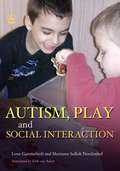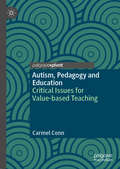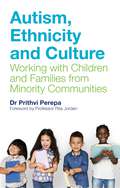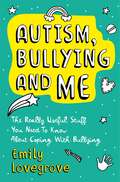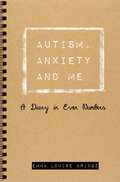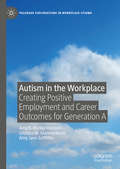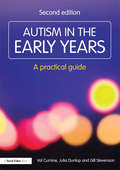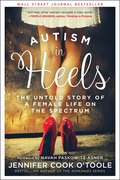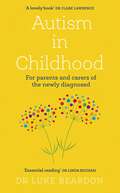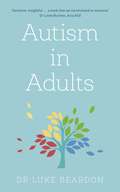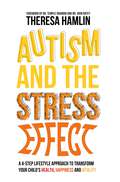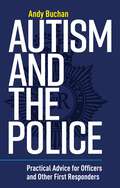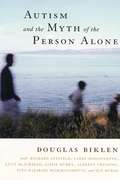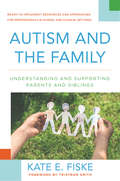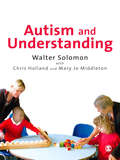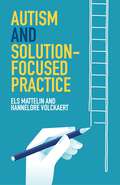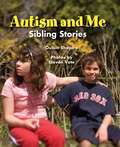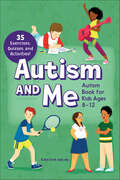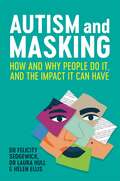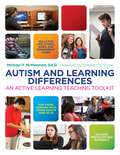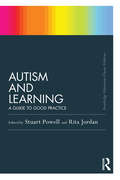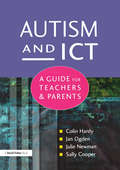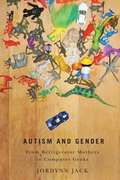- Table View
- List View
Autism, Play and Social Interaction
by Marianne Sollok Nordenhof Lone GammeltoftAutism, Play and Social Interaction is a fully illustrated guide that explains how to help children with autism spectrum disorders engage in interactive play, which is vital for the acquisition of social skills and attention to shared activities. The authors explain how to set up suitably structured play environments, games schedules and play routines, and how to use visual aids and other props to facilitate co-operative play and interaction. Common children's games have been adapted to accommodate children with autism spectrum disorders and range from simple interaction, such as `putting-in' and `give and take', to more complex games like `hide and seek', `sound-lotto' and `spin the bottle', as well as games that teach social behaviour, such as exchanging toys and engaging with other children for play opportunities. This is a practical and accessible book for parents and teachers of children with autism spectrum disorders, as well as professionals working with these children.
Autism, Pedagogy and Education: Critical Issues for Value-based Teaching
by Carmel ConnThis book discusses critical issues concerning autism and education, and what constitutes effective pedagogy for this group of learners. Autism is a high-profile area within the discipline of special education, and the issue of how to teach autistic learners remains a contested one: recent theorising has questioned a techno-rationalist approach that places the burden of change on the autistic pupil. The author explores the values that underpin educational approaches within existing pedagogical practice: while these approaches have their individual merits and shortcomings, this book introduces and expands upon a strengths-based approach. This book will appeal to students and scholars of autism and education, with particular regard to teaching autistic learners.
Autism, Ethnicity and Culture: Working with Children and Families from Minority Communities
by Prithvi PerepaAutism affects all ethnicities, yet professionals do not always have the skills required to support the diverse needs of autistic young people and their families from different communities. As a result, families from these communities often experience issues in getting a diagnosis, access to educational and social care settings, appropriateness of social skills being taught to children, and misinterpretation of behaviour exhibited by these children, which can also lead to higher rates of exclusions. This innovative book provides professionals with knowledge about the issues faced and equips them with practical strategies to resolve them. Drawing on his extensive experience and research, Perepa combines a comprehensive overview of autism and minority ethnic communities with guidance on how best to support children and young people from these communities. An essential resource for professionals working in our increasingly multicultural society.
Autism, Bullying and Me: The Really Useful Stuff You Need to Know About Coping Brilliantly with Bullying
by Emily LovegroveIt's not always easy to stand out from the crowd, especially if you're a teenager. There's a lot of information out there on how to deal with bullying, but a lot of it is contradictory or seems like it won't work...But this guidebook is different! Helping you sort fact from fiction, the book looks at the different forms bullying can take and debunks commonly held myths such as 'bullying makes you stronger' and 'ignore it and it will stop'. You'll learn techniques to clear your mind so that you can respond to bullying situations calmly and confidently and be positive about who you are. Finally, it's packed with self-empowering strategies for coping with being autistic in a neurotypical world, and practical tips so you can handle any bullying scenario.
Autism, Anxiety and Me: A Diary in Even Numbers
by Penelope Bridge Emma Louise BridgeSurely my way is not always wrong, just because it's different from other people's ways? I mean everyone's way is weird to someone... In her 24 years Emma has experienced a lot, and much of this has been coloured by her autism and social anxiety. Funny and self-aware, this collection of Emma's diary entries capture her hidden thoughts and insightful explanations as to why the world can be such a puzzling place. Wry observations on social rules, friendships, relationships, and facing changes give compelling insight into how Emma confronts challenges, and her determination to live life to the fullest. Helpful advice at the end of each entry also give practical strategies for coping with common issues.
Autism in the Workplace: Creating Positive Employment and Career Outcomes for Generation A (Palgrave Explorations in Workplace Stigma)
by Amy E. Hurley-Hanson Cristina M. Giannantonio Amy Jane GriffithsThis book explores the career experiences of Generation A, the half-million individuals with autism spectrum disorder (ASD) who will reach adulthood in the next decade. With Generation A eligible to enter the workforce in unprecedented numbers, research is needed to help individuals, organizations, and educational institutions to work together to create successful work experiences and career outcomes for individuals with ASD. Issues surrounding ASD in the workplace are discussed from individual, organizational, and societal perspectives. This book also examines the stigma of autism and how it may affect the employment and career experiences of individuals with ASD. This timely book provides researchers, practitioners, and employers with empirical data that examines the work and career experiences of individuals with ASD. It offers a framework for organizations committed to hiring individuals with ASD and enhancing their work experiences and career outcomes now and in the future.
Autism in the Early Years: A Practical Guide (Resource Materials for Teachers)
by Val Cumine Gill Stevenson Julia DunlopAnyone meeting a young child with autism for the first time will find this fully revised edition of a classic text invaluable. The authors provide parents and professionals with an insight into the nature and educational implications of autism, particularly in very young children. In a clear and sensitive style the authors: outline the characteristics of autism as they present themselves in the early years; consider the nature of autism and the issues surrounding assessment and diagnosis; offer practical strategies for effective and realistic intervention both at home and in a variety of early years settings; suggest ways to promote learning, social development, communication and appropriate behaviour; explore possibilities for enhancing access to the early years curriculum. This updated second edition includes new material relating to new statutory requirements such as Every Child Matters and Disability Equality Duty, as well as updates to different approaches to autism, assessment and behavioural issues. The authors outline the principal themes and objectives of the Early Years Foundation Stage and the Inclusion Development Programme. Autism in the Early Years: A Practical Guide (Second Edition) provides accessible material, support and advice for parents, teachers and professionals who are working together in an unfamiliar area following early diagnoses of autism in young children.
Autism in Heels: The Untold Story of a Female Life on the Spectrum
by Jennifer O'TooleThe face of autism is changing. And more often than we realize, that face is wearing lipstick.<p><p>Autism in Heels, an intimate memoir, reveals the woman inside one of autism’s most prominent figures, Jennifer O'Toole. <p><p>At the age of thirty-five, Jennifer was diagnosed with Asperger's syndrome, and for the first time in her life, things made sense. Now, Jennifer exposes the constant struggle between carefully crafted persona and authentic existence, editing the autism script with wit, candor, passion, and power. Her journey is one of reverse-self-discovery not only as an Aspie but--more importantly--as a thoroughly modern woman.<p><p>Beyond being a memoir, Autism in Heels is a love letter to all women. It’s a conversation starter. A game changer. And a firsthand account of what it is to walk in Jennifer's shoes (especially those iconic red stilettos).<p><p>Whether it's bad perms or body image, sexuality or self-esteem, Jennifer's is as much a human journey as one on the spectrum. Because autism "looks a bit different in pink," most girls and women who fit the profile are not identified, facing years of avoidable anxiety, eating disorders, volatile relationships, self-harm, and stunted independence. Jennifer has been there, too. Autism in Heels takes that message to the mainstream.From her own struggles and self-discovery, she has built an empire of empowerment, inspiring women the world over to realize they aren't mistakes. They are misunderstood miracles.
Autism in Childhood: For parents and carers of the newly diagnosed
by Luke Beardon"If every parent receiving a diagnosis of autism for their child could read this book, it would avoid so much misunderstanding and unhappiness." - Dr Clare LawrenceA diagnosis - or a suspected diagnosis - of autism in a child can be overwhelming for a parent, especially if you know nothing, or very little, about either of them.Dr Luke Beardon is a well-known expert in the field, and this book is an accessible, easy-to-read introduction for those encountering autism for the first time. Gently and honestly, it guides you through the issues you might encounter, busting the myths around autism, and explaining what the diagnosis means for your child, for you, and for your wider family. It looks at sensory profiles, helps you handle your child's anxiety, tackles education, and answers a variety of frequently asked questions.Other topics covered by this sensitive and empowering book include how to have conversations with your child (the 'autistic voice'), how to manage your child's education and - importantly - the undeniable strengths of autism.As an introduction to - and a celebration of - the intriguing, beguiling, frustrating and remarkable world of autism, this book will help you understand your child's unique value and importance in the world.
Autism in Adults
by Luke BeardonIf you've recently been diagnosed with ASD, or think you might be, or you are close to someone with ASD, one of the things you will like most about this book is the way in which it challenges the idea of autism as a 'disorder' or 'impairment'.Instead, Dr Luke Beardon will help you to reframe what you feel, and challenge what you know, about being on the spectrum. He explains how autism impacts on the individual, and what purpose a diagnosis might - or might not - serve. There is a lot of myth-busting, and dismantling of the stereotypes and clichés around ASD and areas like communication, social interaction and relationships. Practical tips for undiagnosed adults will help you navigate things like school, work, study, parenthood and even to understand what happens when autistic people break the law.Above all, this book is a celebration of what it means to be autistic - of the passion, honesty, humour, lack of ego, loyalty and trustworthiness that make you, or your loved one, such an amazing person.
Autism in Adults
by Luke BeardonIf you've recently been diagnosed with ASD, or think you might be, or you are close to someone with ASD, one of the things you will like most about this book is the way in which it challenges the idea of autism as a 'disorder' or 'impairment'.Instead, Dr Luke Beardon will help you to reframe what you feel, and challenge what you know, about being on the spectrum. He explains how autism impacts on the individual, and what purpose a diagnosis might - or might not - serve. There is a lot of myth-busting, and dismantling of the stereotypes and clichés around ASD and areas like communication, social interaction and relationships. Practical tips for undiagnosed adults will help you navigate things like school, work, study, parenthood and even to understand what happens when autistic people break the law.Above all, this book is a celebration of what it means to be autistic - of the passion, honesty, humour, lack of ego, loyalty and trustworthiness that make you, or your loved one, such an amazing person.
Autism for Adults: An Approachable Guide to Living Excellently on the Spectrum
by Daniel M. JonesThe Ultimate Handbook for Success on the Spectrum – written from lived experience.I feel like everyone else got a handbook with all the answers, and I never got my copy. This is a common thought among autistic people, because society is built with neurotypical people in mind – but that handbook has finally arrived. Even better, it was written by an autism activist who is on the spectrum himself.Autistic influencer Daniel M Jones is an expert on living well on the spectrum. No matter what you're going through as someone with autism, Dan gets it – he's been there. He's here to explain everything he learned, and then some, in this instruction manual and memoir about life as an autistic person. Dan's book is packed with actionable advice that readers can immediately start putting into practice. You'll learn how to navigate common challenges, such as dating on the spectrum, holding down a job or performing well in in your studies. Best of all, you'll learn to improve your life while also empowering yourself.Dan's honesty, self-awareness and sheer knowledge of autism make for a down-to-earth and relatable read that anyone will enjoy. No matter where you are on the spectrum, you'll love this hilarious and comprehensive guide to living an excellent life as an autistic adult.
Autism and the Stress Effect: A 4-step lifestyle approach to transform your child’s health, happiness and vitality
by Theresa Hamlin John RateyPresenting a revolutionary lifestyle approach for the whole family, this step-by-step guide will help you to reduce your child's stress and anxiety levels by regulating their environment, eating and nutrition, energy, and encouraging emotional self-regulation. Children with autism often experience very high stress levels in learning and social environments, which can exacerbate problem behaviors and damage their physical and emotional health. This book demonstrates that lowering stress levels through regulating a child's experiences and environments, and giving them the tools to cope when stressful situations are unavoidable, can make a huge and very positive difference to their behavior, physical health, socialisation and happiness. Brimming with exercises, recipes, tips and real-life examples, this warm and supportive guide will help you transform the life of your child with autism and benefit the whole family.
Autism and the Police: Practical Advice for Officers and Other First Responders
by Andrew BuchanThis is a practical guide for police officers and other first responders written by an autistic retired policeman, designed to demystify autistic behaviours and improve the treatment of autistic people caught up in the criminal justice system. Police officers and other emergency services are the first to arrive at the scene of an incident and it is vital they can recognise autistic behaviours and respond accordingly to avoid any escalation. This book lays out how to identify whether someone could be autistic and how officers can interact with them effectively and sensitively. Based on the author's many years of experience as a police officer it covers common scenarios such as stop and search, restraint and transportation, interviews and detention. For each potential encounter the book provides strategies, examples and tips to assist police in interacting safely and fairly with autistic people. In addition to police interactions, the book explains how to best respond to and assist autistic people through the Criminal Justice System and beyond.
Autism and the Myth of the Person Alone
by Douglas BiklenAutism has been defined by experts as a developmental disorder affecting social and communication skills as well as verbal and nonverbal communication. It is said to occur in as many as 2 to 6 in 1,000 individuals. This book challenges the prevailing, tragic narrative of impairment that so often characterizes discussions about autism. Autism and the Myth of the Person Alone seriously engages the perspectives of people with autism, including those who have been considered as the most severely disabled within the autism spectrum. The heart of the book consists of chapters by people with autism themselves, either in an interview format with the author or written by themselves. Each author communicates either by typing or by a combination of speech and typing. These chapters are framed by a substantive introduction and conclusion that contextualize the book, the methodology, and the analysis, and situate it within a critical disability studies framework. The volume allows a look into the rich and insightful perspectives of people who have heretofore been thought of as uninterested in the world.
Autism and the Family: Understanding and Supporting Parents and Siblings
by Kate E. Fiske Tristram SmithReady-to-implement resources and approaches for effective professional care in school and clinical settings. The reverberations of autism spectrum disorders among parents and siblings can be complex. Parents may grapple with the impact of their child's initial diagnosis, wrestle with the tension between their professional ambitions and family obligations, and labor to maintain a healthy union with their partners. Brothers and sisters may be given less attention, asked to assume a more adult role than they feel ready for, or strive for meaningful connection and communication with their sibling and parents. Although the energy of clinicians, teachers, and other professionals working with individuals with autism spectrum disorder is often focused intensively on the child who is diagnosed, the practitioner can also be an invaluable resource for the child's family. Drawing upon clinical research and firsthand family interviews, this book helps clinicians understand the experiences of parents and siblings of a child with ASD from the time of diagnosis through adulthood. It provides clear recommendations for sensitive, informed professional support. Step-by-step in each chapter, Fiske elucidates such vital subjects as: Understanding the experience of diagnosis Recognizing patterns of parent stress over time Appreciating and navigating the effects of ASD on relationships between parents Involving and providing support for siblings Integrating grandparents and other extended family in care and treatment Understanding a family's culture Identifying and developing effective coping strategies Building a strong rapport with parents and family Guiding parents in the treatment of autism And many more, including key takeaways for assisting families in managing feelings of grief and guilt, navigating support options, treatment resources, and related financial concerns, and calibrating the division of labor in the home. Autism and the Family supplies all the foundations necessary for professionals to understand the full impact of ASD on the child, siblings, and parents and cultivate an empathic, supportive approach to treatment for the entire family.
Autism and Understanding: The Waldon Approach to Child Development
by Walter Solomon Chris Holland Mary Jo MiddletonThe author sets out an approach based on Dr Geoffrey Waldon's philosophy of the development of understanding, which centres on helping children learn-how-to-learn. The book includes: - The inspirational and well documented story of the author's son, diagnosed at two with autism and as 'basically sub-normal', now a successful professional with a wife and child. - An introduction to Geoffrey Waldon's theory and working methods. - Testimony from parents and teachers, covering autism and a range of learning difficulties. This book does not offer a 'miracle cure' for autism, although the author aims to counteract the prevailing view that autism is a lifetime condition. The author demonstrates that with the appropriate intervention, children with autism - and other special needs - can gain a fuller understanding of the world and learn to take a constructive and contributing place in it. Teachers, therapists, doctors, parents and special interest groups will find this book an important and potentially transformational read. Listen to a podcast of Walter Solomon discuss the story of his son Robert, the motivation behind his new book and how to get started using the Waldon Approach. Listen here Or watch the video here!
Autism and Solution-focused Practice
by Elaine Cook Els Mattelin Hannelore VolckaertTo help clients with autism think differently about their future, practitioners need to think differently about autism... Solution-focused practice is founded on a firm belief that the full potential of every human being can be realized. This concise, pragmatic guide explains how the practice can be effectively adapted to help clients on the autism spectrum find solutions to their problems, by addressing autism not as a disability but as a different way of thinking. The first section is a helpful introduction to how solution-focused practitioners can gain an understanding of autism by viewing it from a 'different culture' perspective; the second part offers handy rules and tips for applying knowledge respectfully and creating successful conversations with clients. People with autism often feel let down by social support services. This forward-thinking book is a vital resource for helping clients feel welcome and empowered in helping settings and beyond.
Autism and Me: Sibling Stories
by Ouisie ShapiroIn these moving essays, children tell their stories of what it is like to live with a sibling who has autism.
Autism and Me: Autism Book for Kids Ages 8–12
by Katie CookHelp children understand their autism and thrive with this positive guide for kids ages 8 to 12 We all think differently. This notion is celebrated in Autism and Me, a guide that helps children with autism spectrum disorder (ASD) gain a better understanding of how their brain works. The book highlights positive ASD traits while showing kids how they can work through some of its challenges as well.Unlike some other autism books for kids, this guide offers: Awesome activities—Interactive exercises encourage kids to apply the concepts discussed in a fun, low-stakes way, from fill-in-the-blanks and multiple choice quizzes to drawing and coloring.Proven strategies—From improving communication skills to developing self-care habits, kids will find strategies to help them better navigate school, social functions, and family life.True stories—Each chapter begins with real life anecdotes, offering relatable experiences from others on the autism spectrum and helping kids feel less alone.Kids will learn to manage emotions, make friends, and flourish with this strengths-based autism book.
Autism and Masking: How and Why People Do It, and the Impact It Can Have
by Helen Ellis Felicity Sedgewick Laura HullAutistic people often feel they have to present as neurotypical or perform neurotypical social behaviours in order to fit in. So-called 'masking' is a social survival strategy used by autistic people in situations where neurodiversity is not understood or welcomed. While this is a commonly observed phenomenon in the autistic community, the complexities of masking are still not widely understood.This book combines the latest research with personal case studies detailing autistic experiences of masking. It explains what masking is and the various strategies used to mask in social situations. The research also delves into the psychology behind masking and the specifics of masking at school, at social events with peers, and at work. The book looks at the consequences of masking, including the toll it can have on mental and physical health, and suggests guidance for family, professionals, and employers to ameliorate negative effects. With a diverse range of voices, including perspectives across gender, ethnicity and age, this is the comprehensive guide to masking and how to support autistic people who mask.
Autism and Learning Differences: An Active Learning Teaching Toolkit
by Michael P. Mcmanmon Stephen M. ShoreTeaching essential skills for life, school, work, and independent living, this comprehensive and practical toolkit supports educators and clinicians in their work with adolescents and young adults with an Autism Spectrum Disorder (ASD) or Learning Difference (LD) diagnosis. It presents tried-and-true strategies that address difficulties with social skills and Executive Function, cognitive rigidity, self-esteem issues, and more. It includes: - Focused chapters on skills for life, school, work, and independent living - Photocopiable teaching materials and tips for classroom management - Sections on peer-mentoring, mediation, and inclusion - Assessment strategies, including student self-assessment materials and feedback forms - Contributions from experts in the field, including Dr. Stephen Shore, Liane Holliday Willey, Dr. Brenda Smith Myles, Barbara Bissonnette and Jennifer Cook O'Toole. Drawing on over 30 years' teaching experience at the College Internship Program (CIP), Dr. Michael P. McManmon's toolkit is a complete curriculum for educators, clinicians, and professionals who teach or advise young adults on the ASD or LD Spectrum. It can also be used effectively by parents and individuals for self-study.
Autism and Learning (Classic Edition): A guide to good practice
by Rita Jordan Stuart PowellAutism is a complex and often puzzling disorder in which pinning down a set of rules surrounding the teaching of children with it is almost impossible to do. Many theories and approaches claim to have the solution to teaching, yet few provide the answers when an autistic child goes against the status quo.Autism and Learning addresses this problem w
Autism and ICT: A Guide for Teachers and Parents
by Julie Newman Sally Cooper Colin Hardy Jan OgdenThis book offers a practical approach for staff and carers who want to develop the use of ICT for children on the autistic spectrum and for those with language and communication difficulties. It combines descriptions of current research and literature on the subject of autism and ICT with practical guidance on software and hardware. A practical approach encourages experimentation, values the skills and attributes that participants bring and minimizes the technical barrier to ICT use. It includes concise information on what autism is, and examples of a range of pupils and their typical learning behaviors. It offers advice on how ICT can relate to various aspects of autism, information on concept keyboards and touch-sensitive screens and switches, and help with buying a computer and using the internet. Teachers, carers and parents of children with autism or language and communication problems will find lots of useful suggestions and advice on how to use ICT to help access the curriculum.
Autism and Gender: From Refrigerator Mothers to Computer Geeks
by Jordynn JackThe reasons behind the increase in autism diagnoses have become hotly contested in the media as well as within the medical, scholarly, and autistic communities. Jordynn Jack suggests the proliferating number of discussions point to autism as a rhetorical phenomenon that engenders attempts to persuade through arguments, appeals to emotions, and representational strategies. In Autism and Gender: From Refrigerator Mothers to Computer Geeks, Jack focuses on the ways gender influences popular discussion and understanding of autism's causes and effects. She identifies gendered theories like the “refrigerator mother” theory, for example, which blames emotionally distant mothers for autism, and the “extreme male brain” theory, which links autism to the modes of systematic thinking found in male computer geeks. Jack's analysis reveals how people employ such highly gendered theories to craft rhetorical narratives around stock characters--fix-it dads, heroic mother warriors rescuing children from autism--that advocate for ends beyond the story itself while also allowing the storyteller to gain authority, understand the disorder, and take part in debates. Autism and Gender reveals the ways we build narratives around controversial topics while offering new insights into the ways rhetorical inquiry can and does contribute to conversations about gender and disability.
